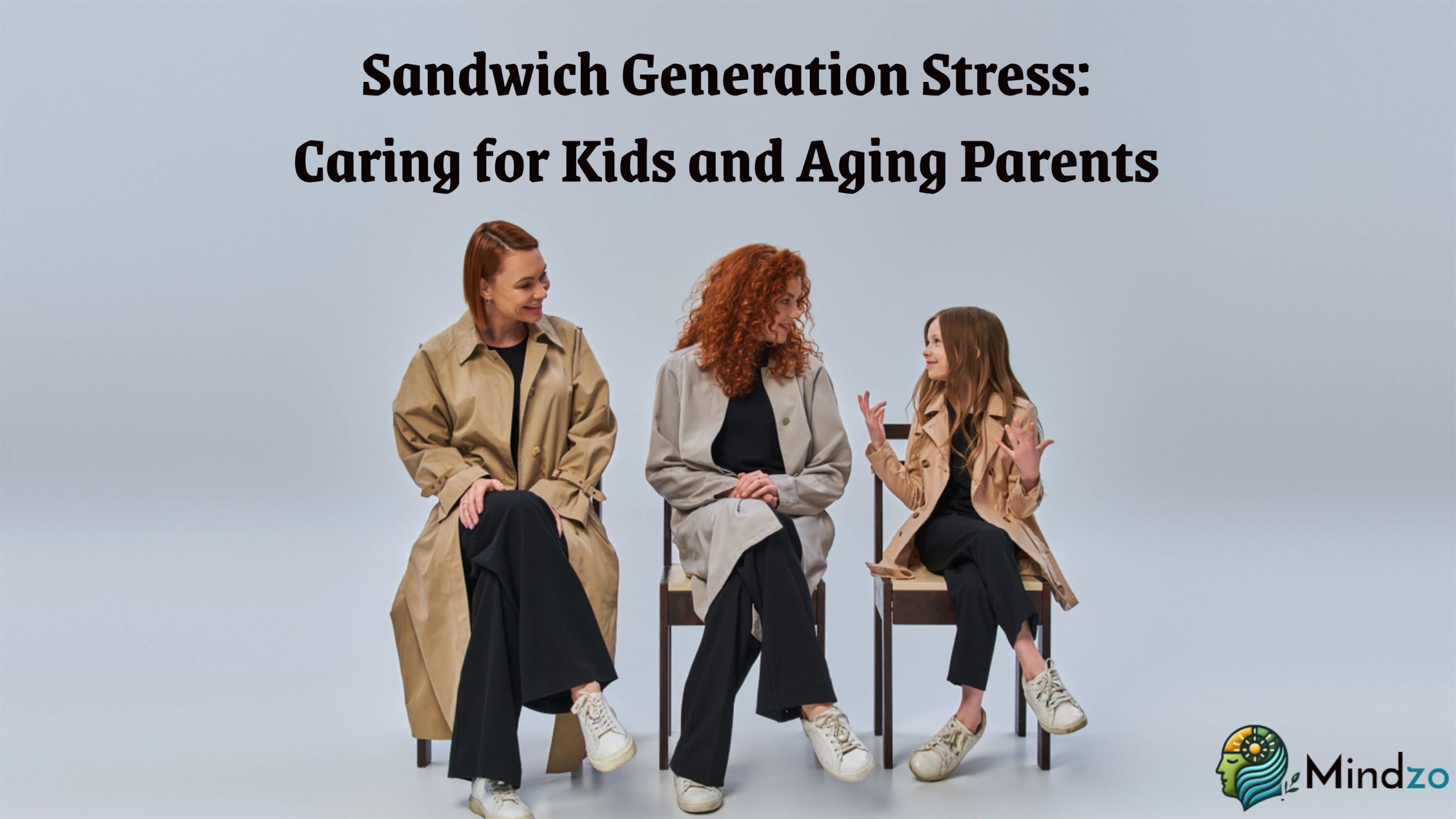Sandwich Generation Stress: Caring for Kids and Aging Parents

The Invisible Weight of Being in the Middle
Imagine finishing a long workday, picking up your kids from school, helping with homework, cooking dinner and then rushing over to check on your aging parents, who need help with medications, groceries, or simply companionship. This is the daily reality for millions of adults caught in what is often called the “sandwich generation.”
The term describes people, typically in their 30s to 50s, who are simultaneously caring for their children while also supporting aging parents. It’s a balancing act that can feel overwhelming, leaving many stretched thin emotionally, financially, and physically.
In today’s world, where people live longer and the cost of childcare and eldercare is high, this role has become increasingly common and increasingly stressful.
The Double Pressure: Kids and Parents Both Needing You
The core struggle of the sandwich generation is that both children and aging parents require intensive care, but in very different ways.
- Children’s needs: School runs, extracurriculars, emotional support, financial investment, and daily nurturing. Kids depend on you for guidance, stability, and love.
- Parents’ needs: Doctor visits, financial planning, managing medications, transportation, home assistance, and, in some cases, navigating dementia or chronic illnesses.
The challenge isn’t just about time. It’s the emotional whiplash of switching between roles comforting your child after a tough day at school, then trying to soothe your parent’s frustration with memory loss or declining health.
This constant juggling act leaves many feeling like they’re “always on call” and never fully present for anyone.
The Emotional Toll on Mental Health
The pressure of being “sandwiched” often leads to profound emotional stress:
- Chronic stress and anxiety – Worrying about whether you’re doing enough for both kids and parents becomes a constant mental loop.
- Burnout – Caregiving can feel relentless, with little time to recharge.
- Guilt – Many feel guilty that they’re neglecting either their children, their parents, or themselves.
- Isolation – With so many responsibilities, social lives shrink, leaving little room for friendships or leisure.
Over time, this strain can lead to depression, insomnia, and even physical health problems like high blood pressure or weakened immunity. It’s not just stress it’s the kind of stress that burrows deep into the body and mind.
How It Affects Family Relationships
The ripple effects of sandwich generation stress often show up in family dynamics:
- Spousal relationships – Partners may feel neglected, leading to tension or resentment.
- Children’s experience – Kids may feel their needs are sidelined, or they may take on extra responsibilities too young.
- Sibling conflicts – Caregiving responsibilities for parents can ignite disagreements among siblings, especially if the burden isn’t shared equally.
The family home can start to feel less like a place of rest and more like a hub of obligations.
Coping Strategies for the Sandwich Generation
While the stress is undeniable, there are ways to lessen the burden and regain balance.
- Set Clear Boundaries – You can’t be everything to everyone. Saying no to extra commitments, or setting limits on caregiving time, helps preserve energy.
- Prioritize Self-Care (Without Guilt) – Exercise, meditation, or even short breaks can restore mental clarity. Remember: caring for yourself isn’t selfish, it’s necessary to keep caring for others.
- Seek Professional Support – Therapists, counselors, or support groups can provide coping tools and emotional release. Talking to others in the same situation often brings relief and validation.
- Plan Financially – The financial strain of childcare, college funds, and eldercare can be overwhelming. Consulting a financial advisor helps create a realistic plan and reduces anxiety about the future.
- Involve the Family – Encourage open conversations with your partner, children, and siblings. Dividing responsibilities,even small ones lightens the load.
- Use Available Resources – Government programs, eldercare services, and community organizations often provide support with transportation, respite care, or meal services. Many families don’t realize help is available until they ask.
The Role of Community and Support Systems
Being sandwiched doesn’t mean being alone. Many find strength through community support systems, including:
- Support groups for caregivers (both in-person and online).
- Faith communities that offer emotional and sometimes practical help.
- Friends and extended family who can pitch in, even for small tasks.
Having a circle of people to lean on prevents feelings of isolation and makes caregiving a shared responsibility rather than a solitary struggle.
Finding Balance and Meaning
Despite the difficulties, some people in the sandwich generation find a sense of purpose and resilience in their role. Caring for parents allows them to return love and support they once received. Raising children at the same time means modeling compassion, responsibility, and family values.
The key is to recognize that while caregiving is meaningful, it should not come at the expense of one’s own health and identity. Finding balance means allowing yourself to be human, acknowledging limitations, asking for help, and celebrating small wins.
Caring for Others While Caring for Yourself
The sandwich generation lives under extraordinary pressure, carrying two generations on their shoulders while trying to maintain their own lives. It’s a heavy role, but it also reflects incredible strength, love, and resilience.
The path forward isn’t about choosing between children and parents, it’s about learning to care for both while remembering to care for yourself.
Because at the heart of it, your family needs not just your presence, but your well-being, too.
Reference:
-
 Beyond Words: The Emotional Medicine of a Simple HugOctober 27, 2025
Beyond Words: The Emotional Medicine of a Simple HugOctober 27, 2025 -
 Music’s Unique Therapeutic BenefitsOctober 23, 2025
Music’s Unique Therapeutic BenefitsOctober 23, 2025

Leave a Reply